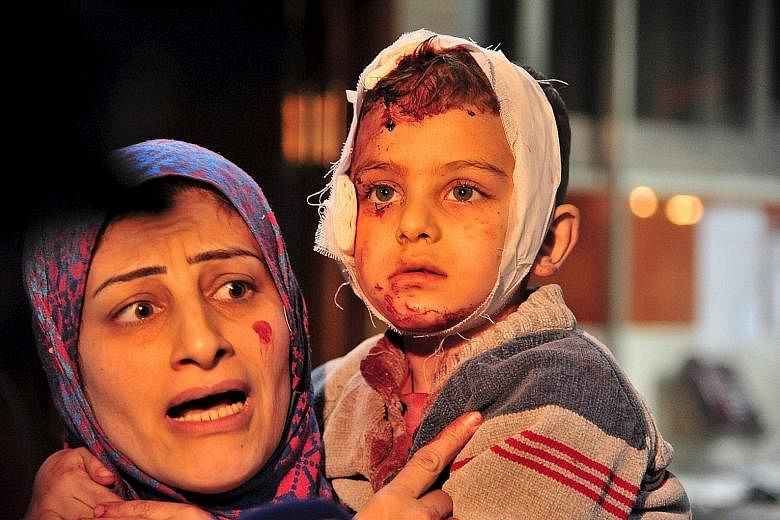AMMAN (Jordan) • Russia's foreign ministry said that a string of suicide bombings in Syria over the weekend, claimed by the Islamic State in Iraq and Syria (ISIS), were aimed at undermining the peace process.
"The atrocious crimes of extremists are aimed at scaring the peaceful population and subverting attempts to reach a long-term political settlement to the Syrian crisis in the interests of all Syrians and efforts to end violence and bloodshed," it said in a statement yesterday.
Moscow said it "decisively condemns" the "inhuman attacks by terrorists" and expressed condolences for the victims.
It also called for a "proper principled reaction from the international community".
It stressed the importance of "reliably blocking" attempts by ISIS, Al-Nusra Front and other groups to "further aggravate the situation in Syria and around it" and inflame division between different faith groups.
The string of suicide bombings claimed by ISIS outside Syria's capital Damascus and in Homs, killing more than 150 people, has overshadowed any progress towards a ceasefire between Washington and Moscow, and by Syria's main opposition factions.
US Secretary of State John Kerry had said on Sunday that a limited ceasefire may be reached soon, after his government and Russia agreed provisionally on its terms.
Scaling back the violence has become even more urgent for the US amid mounting concerns that Turkey and Saudi Arabia will be drawn more deeply into the conflict, in which Russia and Iran are backing Syrian President Bashar al-Assad, and the US, Turkey and Saudi Arabia are supporting rebels, including some radical groups but not ISIS.
In Sunday's attacks, a car bombing followed by two consecutive suicide attacks near Damascus ripped through the area of the Shi'ite shrine of Sayyida Zeinab.
They killed 120 people according to The Syrian Observatory for Human Rights, which said it was the deadliest attack since Syria's war erupted in 2011.
It added that at least 90 civilians were among those killed.
Syria's official news agency, Sana, said 178 people, including children, were among the wounded.
Reports said the blasts struck 400m from the Shi'ite shrine containing the grave of a granddaughter of Prophet Muhammad.
An attack last month in the same area - also claimed by ISIS - killed 70 people.
The rights group also reported that two car bombs killed at least 59 people and wounded dozens in the pro-regime district of Al-Zahraa in the central city of Homs.
Many residents are from the Alawite sect of Shia Islam, Syria's ruling clan, who have been regularly targeted.
Syria's main opposition umbrella group began a meeting in the Saudi capital yesterday that is expected to centre on the Syrian armed factions' demand for international guarantees that Iran and Russia will implement a ceasefire.
Also meeting yesterday were top military commanders from 30 nations fighting ISIS, who gathered in Kuwait to discuss ways to defeat the militants.
"As military leaders, it is our responsibility to double efforts and urgently work out suitable plans to eliminate all terrorist groups threatening many countries in the world," the chief of staff of the host country, General Mohammad al-Khader, said.
And Syrian President Bashar al-Assad has told Spain's El Pais newspaper he was "ready" for a ceasefire, but that it should not be exploited by "terrorists".
Meanwhile, Turkish Foreign Minister Mevlut Cavusoglu said yesterday that a military ground operation in Syria by Turkey and Saudi Arabia is not on the agenda, and any such move would need to involve all countries in the US-led coalition against ISIS.
Russian air strikes were the biggest obstacle to achieving a ceasefire in Syria, Mr Cavusoglu told a news conference in Ankara.
AGENCE FRANCE-PRESSE, BLOOMBERG, REUTERS

